
Colloquia
About Colloquia
The colloquium part of SSA is like a meeting of many different book or film clubs simultaneously - a festival! The list of colloquia is posted below. In order to participate in one of the colloquia, you do not have to be presenting anywhere else in the conference. Just arrive at the scheduled location (locations to be announced later).

Woman to woman. Older to younger. Day to day. Life to life. This is God’s beautiful plan. The Titus 2 model of older women living out the gospel alongside younger women is vital for us all to thrive. It is mutually strengthening, glorifies God, and makes His truth believable to our world.
Imagine older women investing themselves in the lives of younger women, blessing whole families and churches. Imagine young wives, moms, and singles gaining wisdom and encouragement from women who’ve been there and have found God’s ways to be true and good. Imagine all women—from older women to young girls—living out His transforming gospel together, growing the entire body of Christ to be more beautiful.
This is Christian community as God designed it. Read this book and take your relationships to new depths, that your life might find its fullest meaning as you adorn the gospel of Christ.
Proposed by Judi Rhodes
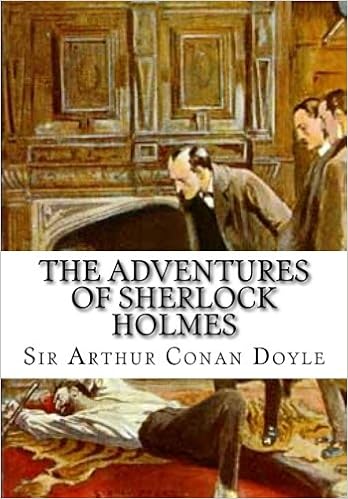
For over one hundred years, this eccentric detective has fascinated the minds of multiple cultures and been reproduced in innumerable media. During the original publication of the Sherlock Holmes stories in the Strand Magazine, all of London was so enthralled that, when Conan Doyle attempted to kill his character and rid himself of the need to contrive such intricate plots, men and women adorned themselves in black in morning of the fictional detective, and Queen Victoria herself sent Conan Doyle a letter, stating that she was “not amused” and subsequently forcing him to resurrect the character.
Around the turn of the century, the Sherlock Holmes stories brought a new interest in science as evidence for crime; it was Sherlock Holmes that created forensic science, not the other way around. Since then, nearly every long-term television series, especially in series aimed at youthful audiences, contains an episode heavily alluring to Holmes. He has starred in two Broadway productions; he has taken to the screen more times than any other fictional character; television shows place him in New York City while the BBC holds him to modern-day London. Recently he has been conceived as a gnome, and in a few short months Will Farrell will portray the character in a farsical comedy.
Holmes touches literature very evidently, science extremely notably, and society in more ways than could ever be fully discerned. With so many portrayals, some version of Holmes ingrains itself on every person’s cultural knowledge. For this reason, it is both interesting and highly enlightening to return to the writings of Conan Doyle and experience the character as he was first interpreted.
Proposed by Emma Duerstock '21

An intimate, powerful, and inspiring memoir by the former First Lady of the United States
In a life filled with meaning and accomplishment, Michelle Obama has emerged as one of the most iconic and compelling women of our era. As First Lady of the United States of America—the first African American to serve in that role—she helped create the most welcoming and inclusive White House in history, while also establishing herself as a powerful advocate for women and girls in the U.S. and around the world, dramatically changing the ways that families pursue healthier and more active lives, and standing with her husband as he led America through some of its most harrowing moments. Along the way, she showed us a few dance moves, crushed Carpool Karaoke, and raised two down-to-earth daughters under an unforgiving media glare.
In her memoir, a work of deep reflection and mesmerizing storytelling, Michelle Obama invites readers into her world, chronicling the experiences that have shaped her—from her childhood on the South Side of Chicago to her years as an executive balancing the demands of motherhood and work, to her time spent at the world’s most famous address. With unerring honesty and lively wit, she describes her triumphs and her disappointments, both public and private, telling her full story as she has lived it—in her own words and on her own terms. Warm, wise, and revelatory, Becoming is the deeply personal reckoning of a woman of soul and substance who has steadily defied expectations—and whose story inspires us to do the same.
Proposed by Rossella Gabriele '19

A revelatory, visually stunning graphic memoir by award-winning artist Nora Krug, telling the story of her attempt to confront the hidden truths of her family’s wartime past in Nazi Germany and to comprehend the forces that have shaped her life, her generation, and history.
Nora Krug was born decades after the fall of the Nazi regime, but the Second World War cast a long shadow throughout her childhood and youth in the city of Karlsruhe, Germany. For Nora, the simple fact of her German citizenship bound her to the Holocaust and its unspeakable atrocities and left her without a sense of cultural belonging. Yet Nora knew little about her own family’s involvement in the war: though all four grandparents lived through the war, they never spoke of it.
In her late thirties, after twelve years in the US, Krug realizes that living abroad has only intensified her need to ask the questions she didn’t dare to as a child and young adult. Returning to Germany, she visits archives, conducts research, and interviews family members, uncovering in the process the stories of her maternal grandfather, a driving teacher in Karlsruhe during the war, and her father’s brother Franz-Karl, who died as a teenage SS soldier in Italy. Her extraordinary quest, spanning continents and generations, pieces together her family’s troubling story and reflects on what it means to be a German of her generation.
Belonging wrestles with the idea of Heimat, the German word for the place that first forms us, where the sensibilities and identity of one generation pass on to the next. In this highly inventive visual memoir—equal parts graphic novel, family scrapbook, and investigative narrative—Nora Krug draws on letters, archival material, flea market finds, and photographs to attempt to understand what it means to belong to one’s country and one’s family. A wholly original record of a German woman’s struggle with the weight of catastrophic history, Belonging is also a reflection on the responsibility that we all have as inheritors of our countries’ pasts.
Proposed by Deborah Miranda and Chris Gavaler
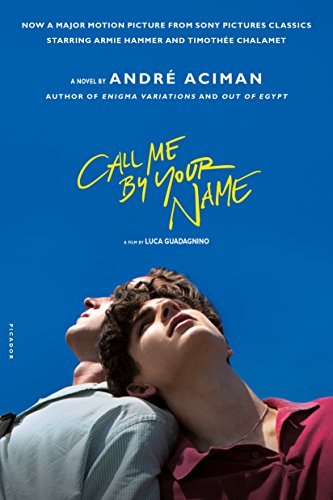
An Instant Classic and One of the Great Love Stories of Our Time
Andre Aciman's Call Me by Your Name is the story of a sudden and powerful romance that blossoms between an adolescent boy and a summer guest at his parents’ cliffside mansion on the Italian Riviera. Each is unprepared for the consequences of their attraction, when, during the restless summer weeks, unrelenting currents of obsession, fascination, and desire intensify their passion and test the charged ground between them. Recklessly, the two verge toward the one thing both fear they may never truly find again: total intimacy. It is an instant classic and one of the great love stories of our time.
The novel will be paired with the award-winning film adaptation by director Luca Guadagnino.
Proposed by David Galvez '22

Birdie and Cole are the daughters of a black father and a white mother, intellectuals and activists in the Civil Rights Movement in 1970s Boston. The sisters are so close that they speak their own language, yet Birdie, with her light skin and straight hair, is often mistaken for white, while Cole is dark enough to fit in with the other kids at school. Despite their differences, Cole is Birdie’s confidant, her protector, the mirror by which she understands herself. Then their parents’ marriage collapses. One night Birdie watches her father and his new girlfriend drive away with Cole. Soon Birdie and her mother are on the road as well, drifting across the country in search of a new home. But for Birdie, home will always be Cole. Haunted by the loss of her sister, she sets out a desperate search for the family that left her behind.
The extraordinary national bestseller that launched Danzy Senna’s literary career, Caucasia is a modern classic, at once a powerful coming of age story and a groundbreaking work on identity and race in America.
Proposed by Virginia Kettles '19

FIND YOUR WILL, FIND YOUR DISCIPLINE--AND YOU WILL FIND YOUR FREEDOM
Jocko Willink's methods for success were born in the SEAL Teams, where he spent most of his adult life, enlisting after high school and rising through the ranks to become the commander of the most highly decorated special operations unit of the war in Iraq. In Discipline Equals Freedom, the #1 New York Times bestselling coauthor of Extreme Ownership describes how he lives that mantra: the mental and physical disciplines he imposes on himself in order to achieve freedom in all aspects of life. Many books offer advice on how to overcome obstacles and reach your goals—but that advice often misses the most critical ingredient: discipline. Without discipline, there will be no real progress. Discipline Equals Freedom covers it all, including strategies and tactics for conquering weakness, procrastination, and fear, and specific physical training presented in workouts for beginner, intermediate, and advanced athletes, and even the best sleep habits and food intake recommended to optimize performance.
Within these pages discover the keys to becoming stronger, smarter, faster, and healthier. There is only one way to achieve true freedom: The Way of Discipline. Read this book and find The Way.
Proposed by Kyle Hallman '20
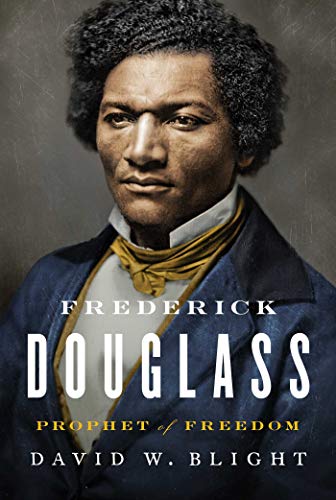
As a young man Frederick Douglass (1818-1895) escaped from slavery in Baltimore, Maryland. He was fortunate to have been taught to read by his slave owner mistress, and he would go on to become one of the major literary figures of his time. He wrote three versions of his autobiography over the course of his lifetime and published his own newspaper. His very existence gave the lie to slave owners: with dignity and great intelligence he bore witness to the brutality of slavery.
Initially mentored by William Lloyd Garrison, Douglass spoke widely, often to large crowds, using his own story to condemn slavery. He broke with Garrison to become a political abolitionist, a Republican, and eventually a Lincoln supporter. By the Civil War and during Reconstruction, Douglass became the most famed and widely travelled orator in the nation. He denounced the premature end of Reconstruction and the emerging Jim Crow era. In his unique and eloquent voice, written and spoken, Douglass was a fierce critic of the United States as well as a radical patriot. He sometimes argued politically with younger African-Americans, but he never forsook either the Republican party or the cause of black civil and political rights.
In this remarkable biography, David Blight has drawn on new information held in a private collection that few other historian have consulted, as well as recently discovered issues of Douglass’s newspapers. Blight tells the fascinating story of Douglass’s two marriages and his complex extended family. Douglass was not only an astonishing man of words, but a thinker steeped in Biblical story and theology. There has not been a major biography of Douglass in a quarter century. David Blight’s Frederick Douglass affords this important American the distinguished biography he deserves.
Proposed by Lucas Morel
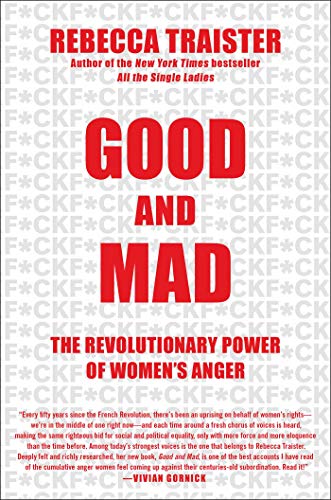
From Rebecca Traister, the New York Times bestselling author of All the Single Ladies comes a vital, incisive exploration into the transformative power of female anger and its ability to transcend into a political movement.
In the year 2018, it seems as if women’s anger has suddenly erupted into the public conversation. But long before Pantsuit Nation, before the Women’s March, and before the #MeToo movement, women’s anger was not only politically catalytic—but politically problematic. The story of female fury and its cultural significance demonstrates the long history of bitter resentment that has enshrouded women’s slow rise to political power in America, as well as the ways that anger is received when it comes from women as opposed to when it comes from men.
With eloquence and fervor, Rebecca tracks the history of female anger as political fuel—from suffragettes marching on the White House to office workers vacating their buildings after Clarence Thomas was confirmed to the Supreme Court. Here Traister explores women’s anger at both men and other women; anger between ideological allies and foes; the varied ways anger is perceived based on its owner; as well as the history of caricaturing and delegitimizing female anger; and the way women’s collective fury has become transformative political fuel—as is most certainly occurring today. She deconstructs society’s (and the media’s) condemnation of female emotion (notably, rage) and the impact of their resulting repercussions.
Highlighting a double standard perpetuated against women by all sexes, and its disastrous, stultifying effect, Traister’s latest is timely and crucial. It offers a glimpse into the galvanizing force of women’s collective anger, which, when harnessed, can change history.
Proposed by Sarah Horowitz

Into a compellingly real portrait of nineteenth-century Russian society, Dostoevsky introduces his ideal hero, the saintly Prince Myshkin. The tensions subsequently unleashed by the hero's innocence, truthfulness, and humility betray the inadequacy of his moral idealism and disclose the spiritual emptiness of a society that cannot accommodate him. Myshkin's mission ends in idiocy and darkness, but it is the world that is rotten, not he.
Written under appalling personal circumstances when Dostoevsky was travelling in Europe, The Idiot not only reveals the author's acute artistic sense and penetrating psychological insight, but also affords his most incisive indictment of Russia's struggling to emulate contemporary Europe and sinking under the weight of Western materialism.
This new translation by Alan Myers is meticulously faithful to the original and has a critical introduction by W. J. Leatherbarrow.
Proposed by Nathan Brewer '19 and Aidan Valente '19

Packed full of practical insights and stories, this is a must-read for all teams. The coach might set the vision for the team but the players carry it out. The coach may define culture but the players make it happen. The true culture of a team is the standards and habits that the players buy into. Whether you are a captain, upperclassman, star or freshman reserve, you can be a leader and influence your team to create a championship culture.
Proposed by Gene McCabe

A war memoir of unusual literary beauty and power from the acclaimed poet who wrote the poem “The Hurt Locker.”
In 2003, Sergeant Brian Turner crossed the line of departure with a convoy of soldiers headed into the Iraqi desert.Now he lies awake each night beside his sleeping wife, imagining himself as a drone aircraft, hovering over the terrains of Bosnia and Vietnam, Iraq and Northern Ireland, the killing fields of Cambodia and the death camps of Europe.
In this breathtaking memoir, award-winning poet Brian Turner retraces his war experience―pre-deployment to combat zone, homecoming to aftermath. Free of self-indulgence or self-glorification, his account combines recollection with the imagination's efforts to make reality comprehensible. Across time, he seeks parallels in the histories of others who have gone to war, especially his taciturn grandfather (World War II), father (Cold War), and uncle (Vietnam). Turner also offers something that is truly rare in a memoir of violent conflict―he sees through the eyes of the enemy, imagining his way into the experience of the "other." Through it all, he paints a devastating portrait of what it means to be a soldier and a human being.
Proposed by Paul Youngman

Jane Austen is one of the founders of classic novels for women. Her most famous novel Pride and Prejudice is rightfully considered to be the masterpiece of the world literature. Walter Scott, Somerset Maugham, Virginia Woolf and Richard Aldington admired the talented “first Lady” of the English literature. Wittily and directly described actions of the novel happen in provincial England in the end of eighteenth century. For about two hundred years readers have been mesmerised by the love story of Mr Darcy and Miss Elizabeth who managed to correct the mistake of pride and prejudice.
Proposed by Erich Uffelman and Taylor Walle

With the end of the Cold War, the victory of liberal democracy was thought to be absolute. Observers declared the end of history, confident in a peaceful, globalized future. But we now know this to be premature. Authoritarianism first returned in Russia, as Putin developed a political system dedicated solely to the consolidation and exercise of power. In the last six years, it has creeped from east to west as nationalism inflames Europe, abetted by Russian propaganda and cyberwarfare. While countries like Poland and Hungary have made hard turns towards authoritarianism, the electoral upsets of 2016 revealed the citizens of the US and UK in revolt against their countries’ longstanding policies and values.
But this threat to the West also presents the opportunity to better understand the pillars of our own political order. In this forceful and unsparing work of contemporary history, Snyder goes beyond the headlines to expose the true nature of the threat to democracy. By showcasing the stark choices before us—between equality or oligarchy, individuality or totality, truth and falsehood—Snyder restores our understanding of the basis of our way of life, offering a way forward in a time of terrible uncertainty.
Proposed by Javier Buenadicha Gomez
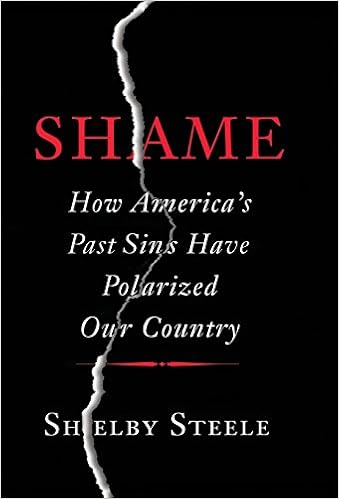
Shelby Steele is one of the most contentious and unpredictable scholars of African-American culture of the past generation. He draws upon multiple intellectual traditions and delights in refusing to be categorized as liberal, conservative, radical, reactionary, etc. As an African-American man talking about the impact of the Civil Rights era upon both white and black America, he brings a unique perspective that is especially useful in our current age. For Steele resists all easy categorizations, and instead asks us to return to basic American concepts of individual responsibility, the task of freedom, and the need to engage one another as civil agents embarked on the great challenge of American democracy. In "Shame," his fifth book, he challenges the premises of what he calls "the great divide" created by America's insistence on identity politics.
Proposed by Marc Conner
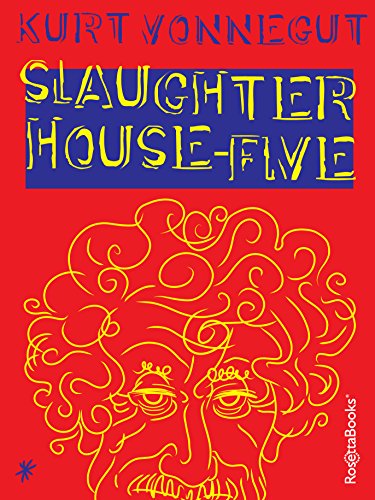
Kurt Vonnegut (1922-2007) is one of the most beloved American writers of the twentieth century. His novel Slaughterhouse-Five (1969) is the now famous parable of Billy Pilgrim, a World War II veteran and POW, who has in the later stage of his life become "unstuck in time" and who experiences at will (or unwillingly) all known events of his chronology out of order and sometimes simultaneously.
Traumatized by the bombing of Dresden at the time he had been imprisoned, Pilgrim drifts through all events and history, sometimes deeply implicated, sometimes a witness. He is surrounded by Vonnegut's usual large cast of continuing characters (notably here the hack science fiction writer Kilgore Trout and the alien Tralmafadorians who oversee his life and remind him constantly that there is no causation, no order, no motive to existence).
The "unstuck" nature of Pilgrim's experience may constitute an early novelistic use of what we now call Post Traumatic Stress Disorder; then again, Pilgrim's aliens may be as "real" as Dresden is real to him. Struggling to find some purpose, order or meaning to his existence and humanity's, Pilgrim meets the beauteous and mysterious Montana Wildhack (certainly the author's best character name), has a child with her and drifts on some supernal plane, finally, in which Kilgore Trout, the Tralmafadorians, Montana Wildhack and the ruins of Dresden do not merge but rather disperse through all planes of existence.
Slaughterhouse-Five was hugely successful, brought Vonnegut an enormous audience, was a finalist for the National Book Award and a bestseller and remains four decades later as timeless and shattering a war fiction as Catch-22, with which it stands as the two signal novels of their riotous and furious decade.
Proposed by Alexander Caines '21

A renowned, respected teacher and mentor to thousands, Sobonfu Somi is one of the first and foremost voices of African spirituality to come to the West.
Somi was born in Dano, Burkina Faso, a remote West African village with a population of about two hundred people. Dano has preserved the old ways of African village life, with family structures, spiritual practices, and methods of living that have been in place for more than ten thousand years. In The Spirit of Intimacy, Somi distills the ancient teachings and wisdom of her native village to give insight into the nature of intimate relationships.
Somi generously applies the subtle knowledge from her West African culture to this one. Simply and beautifully, she reveals the role of spirit in every marriage, friendship, relationship, and community. She shares ancient ways to make our intimate lives more fulfilling and secure and offers powerful insights into the "illusion of romance," divorce, and loss. Her important and fascinating lessons from the heart include the sacred meaning of pleasure, preparing a ritual space for intimacy, and the connection between sex and spirituality. Her ideas are intuitively persuasive, provocative, and healing--and supported by sound practical advice, along with specific rituals and ceremonies based on those used for thousands of years.
With this book, the spiritual insights of indigenous Africa take their place alongside those of native America, ancient Europe, and Asia as important influences on Western readers.
Proposed by MaKayla Lorick '19 amd Amber Cooper

"If there is one book Martin Luther King, Jr. has written that people consistently tell me has changed their lives, it is Strength to Love."
So wrote Coretta Scott King. She continued: "I believe it is because this book best explains the central element of Martin Luther King, Jr.' s philosophy of nonviolence: His belief in a divine, loving presence that binds all life. That insight, luminously conveyed in this classic text, here presented in a new and attractive edition, hints at the personal transformation at the root of social justice: " By reaching into and beyond ourselves and tapping the transcendent moral ethic of love, we shall overcome these evils."
In these short meditative and sermonic pieces, some of them composed in jails and all of them crafted during the tumultuous years of the Civil Rights struggle, Dr. King articulated and espoused in a deeply personal compelling way his commitment to justice and to the intellectual, moral, and spiritual conversion that makes his work as much a blueprint today for Christian discipleship as it was then.
Individual readers, as well as church groups and students will find in this work a challenging yet energizing vision of God and redemptive love.
Proposed by Howard Pickett

The grand finale of Karl Ove Knausgaard's masterful and intensely-personal series about the four seasons, illustrated with paintings by the great German artist Anselm Kiefer
2 June--It is completely dark out now. It is twenty-three minutes to midnight and you have already slept for four hours. What you will dream of tonight, no one will ever know. Even if you were to remember it when you wake up, you wouldn't have a language in which to communicate it to us, nor do I think that you quite understand what dreams are, I think that is still undefined for you, that your thoughts haven't grasped it yet, and that it therefore lies within that strange zone where it neither exists nor doesn't exist.
The conclusion to one of the most extraordinary and original literary projects in recent years, Summer once again intersperses short vividly descriptive essays with emotionally-raw diary entries addressed directly to Knausgaard's newborn daughter. Writing more expansively and, if it is possible, even more intimately and unguardedly than in the previous three volumes, he mines with new depth his difficult memories of his childhood and fraught relationship with his own father. Documenting his family's life in rural Sweden and reflecting on a characteristically eclectic array of subjects--mosquitoes, barbeques, cynicism, and skin, to name just a few--he braids the various threads of the previous volumes into a moving conclusion.
At his most voluminous since My Struggle, his epic sensational series, Knausgaard writes for his daughter, striving to make ready and give meaning to a world at once indifferent and achingly beautiful. In his hands, the overwhelming joys and insoluble pains of family and parenthood come alive with uncommon feeling.
Proposed by Jake Sirota '19
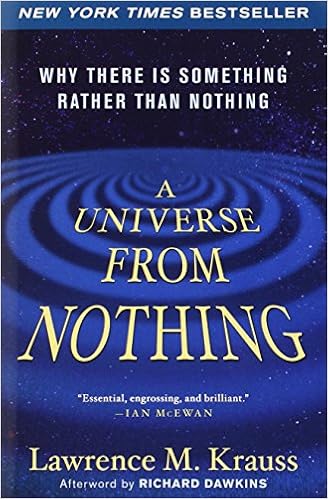
Bestselling author and acclaimed physicist Lawrence Krauss offers a paradigm-shifting view of how everything that exists came to be in the first place.
“Where did the universe come from? What was there before it? What will the future bring? And finally, why is there something rather than nothing?”
One of the few prominent scientists today to have crossed the chasm between science and popular culture, Krauss describes the staggeringly beautiful experimental observations and mind-bending new theories that demonstrate not only can something arise from nothing, something will always arise from nothing. With a new preface about the significance of the discovery of the Higgs particle, A Universe from Nothing uses Krauss’s characteristic wry humor and wonderfully clear explanations to take us back to the beginning of the beginning, presenting the most recent evidence for how our universe evolved—and the implications for how it’s going to end.
Provocative, challenging, and delightfully readable, this is a game-changing look at the most basic underpinning of existence and a powerful antidote to outmoded philosophical, religious, and scientific thinking.
Proposed by Tom McClain

From Marvel Studios. After tragedy forces young Prince T'Challa to assume Wakanda's throne, he is faced with the ultimate test, putting the fate of his country and the entire world at risk. Pitted against his own family, the new king must rally his allies and release the full power of Black Panther to defeat his foes and embrace his future as an Avenger.
Proposed by Leia Barrow '22

Blade Runner 2049 is a 2017 American neo-noir science fiction film directed by Denis Villeneuve and written by Hampton Fancher and Michael Green. A sequel to the 1982 film Blade Runner, the film stars Ryan Gosling and Harrison Ford, with Ana de Armas, Sylvia Hoeks, Robin Wright, Mackenzie Davis, Carla Juri, Lennie James, Dave Bautista, and Jared Leto in supporting roles. Ford and Edward James Olmos reprise their roles from the original film.
Set thirty years after the first film, Gosling plays K, a blade runner who uncovers a secret that threatens to instigate a war between humans and replicants.
Proposed by Thuan Tran '21L
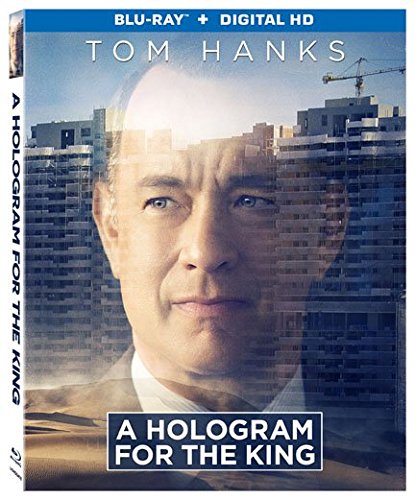
Set during the recession and following a desperate businessman (Tom Hanks) in Saudi Arabia who attempts to leave his mark on the world while fighting foreclosure and paying his daughter's tuition.
Proposed by Allen Litvak '21

Dirty Computer is the third studio album by American singer Janelle Monáe, released on April 27, 2018 by Wondaland Arts Society, Bad Boy Records and Atlantic Records. The concept album was preceded by three singles, "Make Me Feel", "Django Jane", and "Pynk", and one promotional single, "I Like That", and its release was accompanied by a 46-minute narrative film project of the same name. The album received widespread critical acclaim upon release, and peaked at number six on the US Billboard 200. The New York Times refers to Dirty Computer as "a homage to women and the spectrum of sexual identities."
Proposed by Caleb Dance

SOPHIE makes music that is quite literally unprecedented, in terms of both subject matter and sound. Oil of Every Pearl's Un-Insides (a play on words with the phrase "I love every person's insides") is her first full-length album, a collection of songs that come together to form an experience that is truly unique. Her identity having been a mystery for years, SOPHIE finally revealed her voice and her face in the music video for "It's Okay To Cry"; the entire album feels like a thrilling claiming of identity. Booming bass, clanging metal, sweeping celestial textures - SOPHIE's meticulous sound design combines with her powerful themes to make an album that will undoubtedly change the way people think about pop music for years to come.
Proposed by Jeromey Mann
"Por Ti, Yo Seré" is an original piece composed by Diego Saavedra '22. From Diego:
"'Por Ti, Yo Seré' is an original piece that I have composed. It is a classical waltz arranged for a symphonic orchestra. I believe this piece will be interesting to a wide variety of people because it blends the components of different music styles: the traditional Venezuelan waltz and the classical European waltz. I would like to share it with the community because I would receive feedback that would help me with my future compositions. Some discussion questions that the listening might provoke will be the following: Does the piece highlight a relevant event in the Latin-American history? Does the piece allude the appreciation for something physical or spiritual? How have the two music styles been blended? What are the commonalities between the two styles?"
Proposed by Diego Saavedra '22
Please note: SSA is unable to provide access to watch the following TV shows. However, if you have your own access to watch these series and are interested in discussing them, we'd encourage you to sign up!

Based on the debut novel of the same name by writer Gillian Flynn ("Gone Girl"), the eight-episode series "Sharp Objects" stars Amy Adams, in her first major role on the small screen, as reporter Camille Preaker, who returns to her small hometown to investigate mysterious, unsolved crimes. Two girls are missing, one of whom was found dead and presumed murdered. As she searches for clues, Camille reunites with her estranged family -- overbearing mother Adora, stepfather Alan Crellin, and half sister Amma -- which rekindles traumatic childhood memories, including the death of her younger sister. Piecing together a psychological puzzle from her past, Camille begins to identify with the young victims a bit too closely.
Proposed by Anna Daccache '19